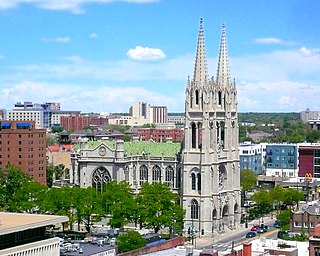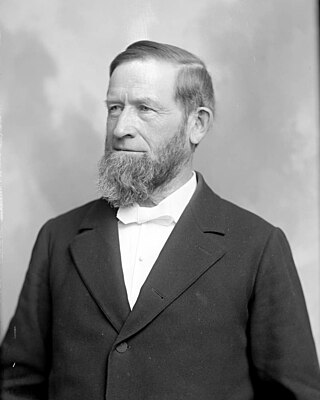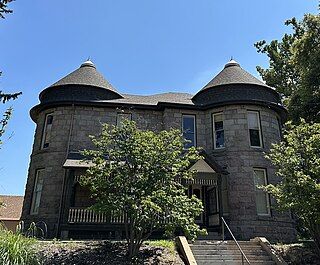
Drew University is a private university in Madison, New Jersey, United States. It has a wooded 186-acre (75 ha) campus. As of fall 2020, more than 2,200 students were pursuing degrees at the university's three schools.

Union Presbyterian Seminary is a Presbyterian seminary in Richmond, Virginia, and Charlotte, North Carolina, offering graduate theological education in multiple modalities: in-person, hybrid, and online.

The Archdiocese of Denver is a Latin Church ecclesiastical jurisdiction, or diocese, of the Catholic Church in northern Colorado in the United States.
Donald E. Messer is an American United Methodist theologian and author, and former college and seminary president. He is known for his work to combat world hunger and HIV/AIDS.
John Lowden Knight was a professor, university administrator, and a Methodist theologian. He was President of Nebraska Wesleyan University, Lincoln, Nebraska; the fourth president of Baldwin-Wallace College, Berea, Ohio; and the eighth president of the Wesley Theological Seminary, in Washington, D.C..

Hygiene is an unincorporated community with a U.S. Post Office in Boulder County, Colorado, United States. Application for the first Hygiene Post Office was made by Jacob Stoner Flory of the United Church of the Brethren on May 28, 1883. Originally named Pella, the community's present name stems from a time when it had a sanatorium to work with tuberculosis patients. St. Vrain Church of the Brethren, a historic Church of the Brethren congregation, is located in the town.
Mary Ann Swenson is an American bishop of the United Methodist Church, elected in 1992.

Henry White Warren (1831–1912) was an American Methodist Episcopal bishop and author. William Fairfield Warren was his brother.
J. Philip Wogaman is former Senior Minister at Foundry United Methodist Church in Washington, D.C. (1992–2002), and former Professor of Christian Ethics at Wesley Theological Seminary Washington, D.C. (1966–92), serving as dean of that institution from 1972–83.

Towson United Methodist Church is a large United Methodist Church in the historic Hampton subdivision of Towson, a suburb in Baltimore County, Maryland. Its past, rooted in 19th-century America and subsequent growth in the two centuries since then, has closely paralleled the nation's political and sociological trends. It was a congregation split in 1861 on the eve of the American Civil War in a border state of divided loyalties, which eventually reunited and built a church in the post–World War II era of the 1950s, a time of reconciliation and rapid growth by mainline Protestant denominations, especially in the more affluent suburbs.

The Evans Memorial Chapel is an historic chapel on the campus of the University of Denver in Colorado. It is the oldest continuously-used building for religious purposes in Denver. Completed in 1878, the Evans Memorial Chapel was built with patronage by John Evans in honor of his daughter Josephine. Evans was governor of the Colorado Territory and a founder of the Colorado Seminary. Once part of Grace Church, a prominent Methodist Episcopal congregation on 13th Avenue and Bannock in downtown Denver, the small Gothic Revival chapel was moved to the University of Denver's campus in 1959. It reopened there in April 1960, and is now the campus's oldest building. It currently serves as an interdenominational chapel and wedding venue.

Fairmount Cemetery in Denver, Colorado, was founded in 1890 and is Denver's second oldest operating cemetery after Riverside Cemetery. It is located in land south-east of the intersection of the major Denver roadways Alameda Ave. and Quebec St.. The cemetery was designed by German landscape architect Reinhard Schuetze. The cemetery was patterned after Mount Auburn Cemetery in Cambridge and Watertown, Massachusetts. The cemetery occupies 280 acres (110 ha). The first year the cemetery opened over 4500 trees and shrubs were planted by Schuetze. The cemetery is the largest arboretum in the state.

John Wesley Iliff Sr. was a Colorado cattle rancher who is the namesake of the Iliff School of Theology in Denver.
Wallace Bruce Clift, Jr. was an American priest and academic. He was the author of several books and articles in the field of the psychology of religion and a professor emeritus at the University of Denver, where he chaired the Department of Religion for many years. He lectured and gave workshops extensively in the United States, Australia, Europe, and Asia on such topics as Jungian psychology, Christian theology, pilgrimage, spiritual growth, dream interpretation, journaling, and the Myers-Briggs Type Indicator. Clift published six books, three of which were co-authored with his wife, the Reverend Jean Dalby Clift.

Richard Finley Ward is an American storyteller and the Fred B. Craddock Professor of Preaching at Phillips Theological Seminary.
Harris Franklin Rall was the first president of Iliff School of Theology in Denver, Colorado after it reopened in 1910 till 1915, and he also served as the Henry White Warren professor of Practical Theology. Rall later became president of Garrett Biblical Institute in Evanston, Illinois, and taught theology there. Rall was active in the social gospel movement, seeking to relate Christianity to the ills of society. Garrett named its lecture series after him.

Jorge Humberto Rodríguez-Novelo is a Mexican-born American prelate of the Roman Catholic Church, serving as an auxiliary bishop for the Archdiocese of Denver since 2016. Rodriguez-Novelo has held teaching positions at Catholic universities and institutions in the United States, Italy and Spain.

South Denver was an incorporated city in Colorado incorporated in 1886 and annexed by Denver in 1894. Covering almost 12 square miles that included the former site of Montana City, the South Denver community was established by James Fleming in 1881 as an alcohol-free community. Potato farmer Rufus "Potato" Clark led a group which donated land to allow the University of Denver to relocate to the area and escape the "moral and environmental pollution" of Denver. Incorporated as a town to enable the community to enforce vice laws, its anti-alcohol regulations surviving the city's dissolution. John Evans, the former Colorado governor, contributed to the community's development by fostering the establishment of the two Methodist-organized subdivisions of University Park Colony and Evanston.

Rufus Clark, also known both as Potato Clark and Dad Clark, was an American pioneer, businessman, politician, and community leader who was dubbed the "Potato King of Colorado". Born in Connecticut, Clark spent time at sea and searching for gold in Australia and California before migrating to Denver from Iowa in 1859 with his second wife and their child during the Pike's Peak Gold Rush. Clark established a 160-acre farm along the South Platte River, acquiring a fortune and substantial landholdings from selling potatoes to miners and Denverites. After his second wife died in 1861, he was elected to the Colorado territorial legislature in 1864 for a single term.














